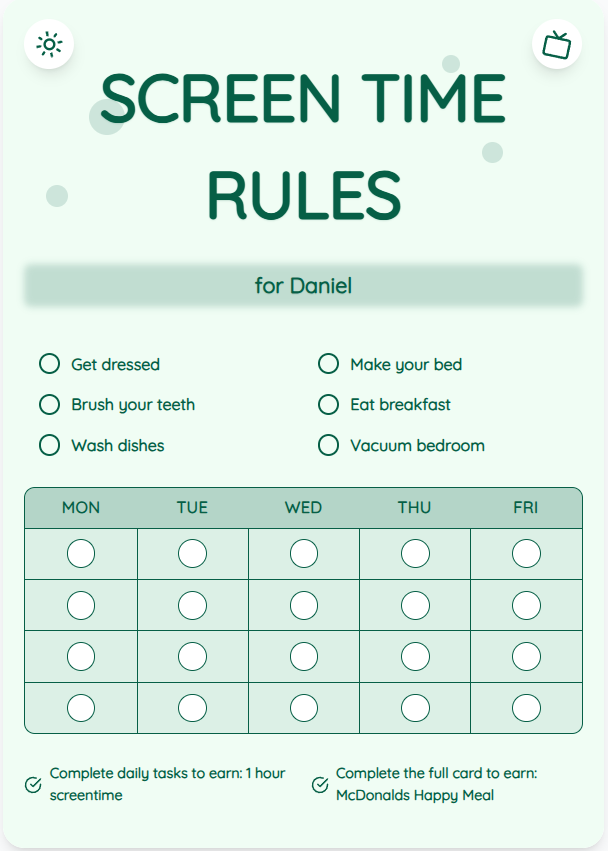Understanding the Impact of Screen Time on Children's Sleep
As a parent, you may wonder how screen time affects your child's sleep patterns. Excessive screen time can disrupt their bedtime routine and quality of sleep. In this guide, we'll explore the connection between screen time and sleep and provide practical tips to help your child get a restful night's sleep.
See What Your Screen Time Chart Will Look Like
Here's an example of a beautiful, customizable screen time rules chart you can create for your family

The Science Behind Screen Time and Sleep
Research shows that exposure to screens before bedtime can interfere with the production of melatonin, the hormone that regulates sleep. Blue light emitted by screens can disrupt the body's natural sleep-wake cycle, making it harder for children to fall asleep. Establishing screen time limits before bedtime is crucial for promoting healthy sleep habits.
Tips for Managing Screen Time to Improve Sleep
1. Set specific screen time limits for different devices. 2. Create a bedtime routine that excludes screens. 3. Encourage outdoor play and physical activities during the day. 4. Use screen time charts to track and manage your child's screen time effectively.
Put These Tips Into Action
Create a custom chart to implement these strategies with your child
Creating a Screen-Free Bedroom Environment
Limit screen use in the bedroom to reduce distractions and promote relaxation. Remove screens from the bedroom or establish a 'no screens before bedtime' rule to create a conducive sleep environment. Encourage reading or storytelling as calming bedtime activities.
Monitoring Screen Time and Sleep Patterns
Observe how screen time affects your child's sleep quality and adjust their screen time accordingly. Keep a log of their screen usage and sleep patterns to identify any correlations. Use this data to make informed decisions about managing screen time for better sleep outcomes.
Practical Tips for Success
- Set specific screen time limits for different devices
- Create a bedtime routine that excludes screens
- Encourage outdoor play and physical activities during the day
- Use screen time charts to track and manage your child's screen time effectively
Frequently Asked Questions
How does screen time affect children's sleep?
Excessive screen time, especially before bedtime, can disrupt melatonin production and interfere with the body's natural sleep-wake cycle, leading to poor sleep quality.
What are the signs that screen time is affecting my child's sleep?
Signs include difficulty falling asleep, frequent nighttime awakenings, and daytime fatigue or irritability.
How can I help my child develop healthy sleep habits despite screen time?
Establish consistent bedtime routines, limit screen use before bedtime, create a screen-free bedroom environment, and monitor screen time and sleep patterns regularly.
Are there age-specific recommendations for managing screen time and sleep for children?
Yes, younger children may need stricter limits on screen time, while older children can benefit from setting boundaries and having open discussions about the impact of screens on sleep.
By understanding how screen time affects your child's sleep and implementing practical strategies like setting limits, creating a screen-free bedroom, and using screen time charts, you can promote healthier sleep habits. Visit ScreenTimeRules.com for customizable screen time charts to help manage your child's screen time effectively.
Ready to Transform Your Family's Screen Time?
Join thousands of parents who have successfully managed screen time with our customizable charts.
